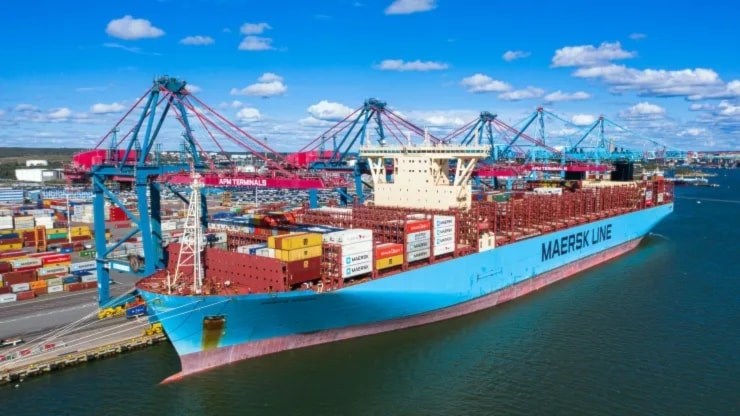Maersk temporarily suspends bookings to Djibouti
The suspension applies to routes originating from Asia, the Middle East, Oceania, East Africa, and South Africa.
-

The container ship Maersk Murcia sits moored in the port of Gothenburg, on August 24, 2020. (AFP via Getty Images)
Danish shipping giant Maersk announced a temporary suspension of bookings to Djibouti on its Blue Nile Express service. The suspension applies to routes originating from Asia, the Middle East, Oceania, East Africa, and South Africa.
"The situation in and around the Red Sea/Gulf of Aden continues to be volatile and all available intelligence at hand confirms that the security risk remains at a significantly high level," Maersk said in a statement.
In further detail, Maersk declared that its Blue Nile Express service will exclude Djibouti, Jeddah, and King Abdullah Port in Saudi Arabia effective immediately.
The usual route of the Blue Nile Express involves linking ports in the United Arab Emirates, Oman, India, Djibouti, and Saudi Arabia. Maersk has stated that it anticipates no disruption to carrying capacity.
This development comes after the aggressions carried out jointly by the US and the UK on Yemen, which experts consider risk navigation in the area and amid an increase in attacks on Israeli and Israeli-bound vessels in the Red Sea, in support of Gaza. The Yemeni Ansar Allah movement has expressed that these acts come as a form of protest against the Israeli occupation's ongoing onslaught in Gaza.
Ansar Allah has made public declarations, vowing to persist with their attacks until aid is allowed into Gaza and until the Israeli occupation forces cease the aggression.
Fourth US-UK aggression on Yemen in less than a week
On January 18, the Sanaa-based Yemeni news agency SABA reported that the United States and Britain renewed their aggression on Yemen early Thursday, for the fourth time in less than a week, targeting the provinces of Hodeidah, Taiz, Dhamar, al-Bayda, and Saada.
Al Mayadeen's correspondent mentioned that the US-UK aggression began with airstrikes on the provinces of Hodeidah and Dhamar and later extended to include the provinces of Saada, Taiz, and Al-Bayda.
According to our correspondent, the aggression was accompanied by the presence of surveillance aircraft flying over the western part of Yemen.
Failure to counter Yemen
One month has passed since the Pentagon announced the launch of Operation Prosperity Guardian. However, it continues to be haunted by the reluctant participation of its members and uncertainty behind the operation's objectives.
Major member countries have announced stepping back or scaling down on commitment to the alliance, including France, which said it will not be operating under Washington's orders and will limit its operations to protect EU vessels, and Spain, which declared it will not participate entirely.
Upon announcing the anti-Yemen force, the leader of the Ansar Allah movement, Sayyed Abdul-Malik al-Houthi, warned the US on December 20 against attacking Yemen, stressing that American battleships and vessels would become a target for Yemeni missiles in the event of any attack.
Moreover, according to the stated objectives of the mission, the US Navy and its allies will seek to escort tens of ships through the Red Sea a day, which speaks to the sheer magnitude of the task at hand.
Read next: Regional conflict already begun following US-UK strikes on Yemen: NYT

 3 Min Read
3 Min Read








